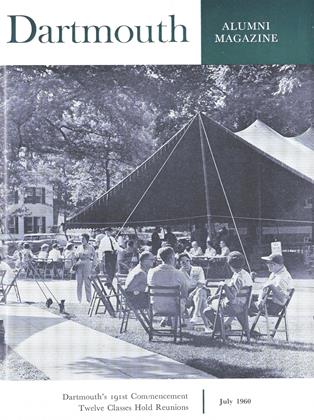By Edward J. Cogan, RobertZ. Norman, and Gerald L. Thompson. Englewood Cliffs, N. J.: Prentice-Hall, i960.557 pp.
The surprising younger group in the Mathematics Department continue their prolific ways. For although Bob Norman is the only one of the three authors with us today, this is very much a Dartmouth book, since both Ed Cogan and Gerry Thompson were in the Department for several years, and to a considerable extent influenced, and were influenced by, our group.
The older generation of teachers never took textbooks very seriously. We preferred a brief, colorless text. The thing that counted was the lecture. The textbook was an inferior source of information for the misguided student who took a long weekend. The main function of the book was to serve as a source of problems.
Which brings us to the point. The Cogan-Norman-Thompson book isn't just another colorless calculus text. This is a dominating text. If you use this book, you will have to change your notation, your way of teaching, your very way of thinking. The authors are extremely competent, but they are also completely uncompromising. You will have to do things their way.
Their way may be very good for the top 10 per cent. This is a rigorous and extremely precise text. Undoubtedly this is just the kind of course that the authors wish they could have had when they were undergraduates. Probably they had the nice, sloppy course which my generation has professed; and they rebelled at its lack of precision. When hundreds of thousands of students annually elect the calculus, I think the highest standards, the utmost rigor are unrealistic. Ideally, talented young geniuses should be steered into Honors Sections, and given all they can take; but this isn't always feasible, and while the talented may be annoyed by our slightly slapdash methods, they won't be permanently harmed. But these same geniuses, grown-up, claim the average student will understand more, and perform better, if he is exposed to a very much higher level of precision. I don't think that's true - but I could be wrong.
What bothers me most is the radical change from "standard" notation. The authors softpedal this in their Preface, but I don't think they quite face up to the issue; for the substitution of
is fairly radical, whatever they say. I agree with the authors that the "standard" notation of the calculus is bad. In the old days when the calculus was not for the democracy, but for the one man in a thousand who could genuinely appreciate it, this involved no hardship. The man who is permanently bothered by notation isn't a mathematician. But now that millions study the calculus, the notation is a real problem. It was never designed for a democracy; in fact it wasn't designed at all, it just grew. It could be much better. The authors have tried to make it better. At the risk of being branded an old fossil, I will simply say I don't think they have succeeded.
Now manifestly, this is a competent, and confident book, and the authors and their disciples may well use it with remarkable results. They have their convictions; I have my doubts; and we remain extremely good friends. Membership in the Dartmouth Mathematics Department assures a fairly liberal post-graduate education.
And yet, these very competent, very serious younger mathematicians don't seem to get as much fun out of life as my generation has. Have they taken too literally the words of the Apostle Paul: "Prove all things; hold fast that which is good"? Is this ultimate in precision, this proving every theorem, the best way to develop a creative mathematician, or even a normal human being? I miss the gay abandon. I miss the "What the hell, let's assume that's all right, and get going."
 View Full Issue
View Full Issue
More From This Issue
-
 Feature
FeatureThe Disinterested Citizen and the Maintenance of Freedom
July 1960 By WHITNEY NORTH SEYMOUR, LL.D. '60 -
 Feature
FeatureThe Fifty-Year Address
July 1960 By ANDREW J. SCARLETT '10 -
 Feature
FeatureHONORARY DEGREE CITATIONS
July 1960 -
 Feature
Feature1960 Commencement
July 1960 By D.E.O. -
 Feature
FeatureThe Image of the Educated Man
July 1960 By HARRISON CASE DUNNING '60 -
 Feature
FeatureThe Reunion Week
July 1960
BANCROFT H. BROWN
Books
-
 Books
BooksFaculty Publications
May 1943 -
 Books
BooksPRISONERS OF PSYCHIATRY: MENTAL PATIENTS, PSYCHIATRISTS, AND THE LAW.
MARCH 1973 By ARDEN BUCHOLZ '58 -
 Books
BooksIntroduction to the Study of Public Administration
DECEMBER 1927 By JAMES P. RICHARDSON. -
 Books
BooksTHE NOVELS OF JANE AUSTEN: AN INTERPRETATION.
March 1974 By KATHERINE LEVER -
 Books
BooksFREEDOM OF SPEECH BY RADIO AND TELEVISION.
APRIL 1959 By LAURENCE I. RADWAY -
 Books
BooksENGLAND ON FIFTY DOLLARS.
June 1934 By Paul G. Allen






